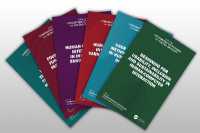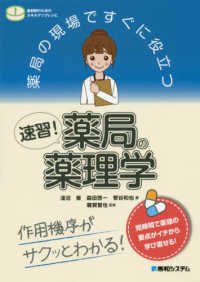Full Description
An in-depth look at self-authorship and students' intellectual growth
The notions of self-authorship, evolution of consciousness, and transition theory are key elements in understanding and molding the modern learning environment and intellectual growth of students. Self-Authorship: Advancing Students' Intellectual Growth is the collaborative work of multiple expert authors. The book takes an in-depth and nuanced look at these relatively new and fascinating theories and how the concepts put forth in the theory of self-authorship can play into influencing learning outcomes for students.
Contents
EDITOR'S NOTES ( Peggy S. Meszaros ). 1. The Journey of Self-Authorship: Why Is It Necessary? ( Peggy S. Meszaros ) This overview of current national efforts to measure the outcomes of higher education also defines key terms and uses the metaphor of a tandem bicycle to introduce the Learning Partnerships Model as context for the chapters that follow. 2. Taking Seriously the Intellectual Growth of Students: Accommodations for Self-Authorship ( Terry M. Wildman ) The premise that real understanding of students' progression in education can be achieved only when we bring together in a common framework theories of learning, development, and instruction is developed in this chapter. New benchmarks for student learning outcomes and the challenges higher education face as the student learning journey is improved are discussed. 3. Assessing Self-Authorship ( Jane Elizabeth Pizzolato ) This chapter describes a measure of self-authorship, reviews its development, and outlines possible practical uses for both formative and summative assessment of students' progress toward self-authorship. 4. Engaging Differences: Self-Authorship and the Decision-Making Process ( Anne Laughlin, Elizabeth G. Creamer ) Using both quantitative and qualitative data, the authors employ the framework of self-authorship to understand the processes students use to make major decisions, including the way they make meaning of information and advice. Insights for parents, educators, and academic and career advisors are given. 5. Making Self-Authorship a Goal of Core Curricula: The Earth Sustainability Pilot Project ( Barbara Bekken, Joan Marie ) This case study of the development of an innovative interdisciplinary multisemester general education program in earth sustainability illustrates the use of self-authorship in forming the curriculum and measuring student learning outcomes. 6. Self-Authorship: The Foundation for Twenty-First-Century Education ( Marcia B. Baxter Magolda ) The imperative to shift from old, controlling teaching and learning designs to new partnership designs is difficult to achieve. This chapter summarizes the promise of self-authorship and provides numerous examples of the potential of the Learning Partnerships Model for transforming educational practice. 7. The Journey of Self-Authorship: Next Steps to the Destination ( Peggy S. Meszaros ) National efforts underway to define student learning outcomes narrowly mandate new approaches for students' holistic intellectual development. This chapter explores necessary next steps for transforming student learning outcomes through the lens of self-authorship. INDEX








